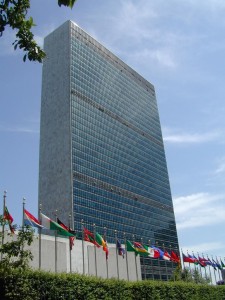Pakistan votes in favour of UN arms trade treaty
Wednesday, April 3rd, 2013 3:44:06 by Tahir Khan
Pakistan vote in favour of the resolution adopted in the General Assembly on Tuesday on Arms Trade Treaty to demonstrate solidarity with the people and States negatively impacted by the illicit trade in conventional arms, particularly small arms and light weapons.
Speaking on the occasion Pakistan’s Permanent representative to the UN, Ambassador Masood Khan said Pakistan by voting in favour of the resolution responded to the aspiration of groups of States in Africa, Latin America, the Caribbean and Europe, as well as to the advocacy of international civil society and the media.
The General Assembly adopted the Arms Trade Treaty contained in resolution A/67/L.58 by a recorded vote of 154 in favour to 3 against (Democratic People’s Republic of Korea, Iran, Syria), with 23 abstentions.
The ambassador said Pakistan supported the humanitarian spirit that had guided the initiative and felt it was time to evolve the global benchmarks for arms transfers. Pakistan shared the view that steps must be taken to ensure that conventional arms were not used for terrorism, transnational organized crime or violation of international human rights or humanitarian law, or be illegally diverted, he said.
Pak envoy, however stressed that the arms trade treaty was “not an arms control or disarmament treaty”. Rather, it was about “responsible arms trade”. He regretted that it could not have been adopted by consensus and believed that a little more flexibility by all sides could have achieved that, thereby ensuring universality and more predictable implementation.
Despite that it had not been possible to achieve consensus in the context of the Conference and that it had been transmitted to the General Assembly for action by a recorded vote, that procedure did not alter the rule of consensus established in the United Nations and other fora.
The meaning of consensus — in the United Nations context — he said, was generally understood as the adoption of a decision without formal objection or vote. The selective interpretation of the Rules of Procedure did not constitute a precedent for future multilateral negotiations.
Turning to key aspects that had not been taken on board, Masood Khan said the treaty ignored the issue of “excessive production”, which was separate from trade in conventional arms. That was a serious omission that could impact the text’s effectiveness.
Further, he said, the treaty could be seen as a product of — and by — arms exporters, and perceived as not striking the necessary balance between the interests and obligations of exporters and importers, as well as affected States. . For a treaty anchored in humanitarian ideals, it was ironic to see that arms exporters of some countries were protected.
Additionally, he said, the text had omitted some important definitions, which departed from established treaty practice that could be used by exporters to circumvent its provisions. Also, there was a lack of accountability for exporters as the text had created some responsibilities, but it did not provide a clear accountability mechanism for exporters that might “flout” new responsibilities related to the criteria. A lack of oversight also could reinforce the idea that the treaty was unfairly tilted in favour of exporters. He hoped such concerns would be addressed and requested that his statement be reflected in the official records.
Tags: Ambassador Masood Khan, Arms Trade Treaty, Pakistan’s Permanent representative to UN, UN General Assembly\Short URL: https://www.newspakistan.pk/?p=39628

















